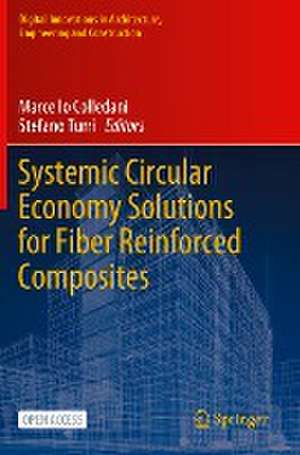Systemic Circular Economy Solutions for Fiber Reinforced Composites: Digital Innovations in Architecture, Engineering and Construction
Editat de Marcello Colledani, Stefano Turrien Limba Engleză Paperback – 8 ian 2023
| Toate formatele și edițiile | Preț | Express |
|---|---|---|
| Paperback (1) | 368.20 lei 6-8 săpt. | |
| Springer International Publishing – 8 ian 2023 | 368.20 lei 6-8 săpt. | |
| Hardback (1) | 444.72 lei 3-5 săpt. | |
| Springer International Publishing – 8 ian 2023 | 444.72 lei 3-5 săpt. |
Din seria Digital Innovations in Architecture, Engineering and Construction
- 18%
 Preț: 939.33 lei
Preț: 939.33 lei - 18%
 Preț: 1006.55 lei
Preț: 1006.55 lei - 24%
 Preț: 838.18 lei
Preț: 838.18 lei - 18%
 Preț: 942.63 lei
Preț: 942.63 lei - 18%
 Preț: 1240.16 lei
Preț: 1240.16 lei - 18%
 Preț: 1103.62 lei
Preț: 1103.62 lei - 18%
 Preț: 1420.88 lei
Preț: 1420.88 lei - 20%
 Preț: 1052.67 lei
Preț: 1052.67 lei - 18%
 Preț: 739.00 lei
Preț: 739.00 lei - 18%
 Preț: 896.84 lei
Preț: 896.84 lei - 18%
 Preț: 784.48 lei
Preț: 784.48 lei - 18%
 Preț: 886.75 lei
Preț: 886.75 lei - 18%
 Preț: 1110.72 lei
Preț: 1110.72 lei - 24%
 Preț: 850.42 lei
Preț: 850.42 lei - 23%
 Preț: 762.58 lei
Preț: 762.58 lei - 20%
 Preț: 985.49 lei
Preț: 985.49 lei
Preț: 368.20 lei
Nou
Puncte Express: 552
Preț estimativ în valută:
70.45€ • 73.76$ • 58.30£
70.45€ • 73.76$ • 58.30£
Carte tipărită la comandă
Livrare economică 05-19 aprilie
Preluare comenzi: 021 569.72.76
Specificații
ISBN-13: 9783031223549
ISBN-10: 3031223543
Pagini: 474
Ilustrații: VI, 474 p. 278 illus., 237 illus. in color.
Dimensiuni: 155 x 235 x 27 mm
Greutate: 0.73 kg
Ediția:1st ed. 2022
Editura: Springer International Publishing
Colecția Springer
Seria Digital Innovations in Architecture, Engineering and Construction
Locul publicării:Cham, Switzerland
ISBN-10: 3031223543
Pagini: 474
Ilustrații: VI, 474 p. 278 illus., 237 illus. in color.
Dimensiuni: 155 x 235 x 27 mm
Greutate: 0.73 kg
Ediția:1st ed. 2022
Editura: Springer International Publishing
Colecția Springer
Seria Digital Innovations in Architecture, Engineering and Construction
Locul publicării:Cham, Switzerland
Cuprins
Introduction, Context, and Motivations of a Circular Economy for Composite Materials.- The FiberEUse Demand-Driven, Cross-Sectorial, Circular Economy Approach.- Disassembly of large composite-rich installations.- Smart composite mechanical demanufacturing processes.- Thermal demanufacturing processes for long fibers recovery.- Styrene-free liquid resins for composite reformulation.- Fiber resizing, compounding and validation.- Additive manufacturing of recycled composites.- Composite Finishing for Reuse.-Composite repair and remanufacturing.- Co-design of creative products embedding recycled fibers.- Modular Car Design for Reuse.- Product Re-design Guidelines.- Cloud-based platform for the circular value-chain.- Use case 1: mechanical recycling of short fibers.- Use case 2: thermal recycling of long fibers.- Use case 3: modular car parts disassembly and remanufacturing.- Material Library System for circular economy.- New business models and logistical considerations for composites re-use.- Economic and risk assessment of new circular economy business models.- Impact of policy actions on the deployment of the circular value-chain for composites.
Textul de pe ultima copertă
This open access book provides an overview of the work undertaken within the FiberEUse project, which developed solutions enhancing the profitability of composite recycling and reuse in value-added products, with a cross-sectorial approach. Glass and carbon fiber reinforced polymers, or composites, are increasingly used as structural materials in many manufacturing sectors like transport, constructions and energy due to their better lightweight and corrosion resistance compared to metals. However, composite recycling is still a challenge since no significant added value in the recycling and reprocessing of composites is demonstrated. FiberEUse developed innovative solutions and business models towards sustainable Circular Economy solutions for post-use composite-made products. Three strategies are presented, namely mechanical recycling of short fibers, thermal recycling of long fibers and modular car parts design for sustainable disassembly and remanufacturing. The validationof the FiberEUse approach within eight industrial demonstrators shows the potentials towards new Circular Economy value-chains for composite materials.
Caracteristici
This book is open access, which means that you have free and unlimited access Will be of interest for public institutions aiming at reducing the environmental footprint of modern economies Presents industry-driven, cross-sectorial circular economy solutions Explores the role of product design for circular economy in composite sector
